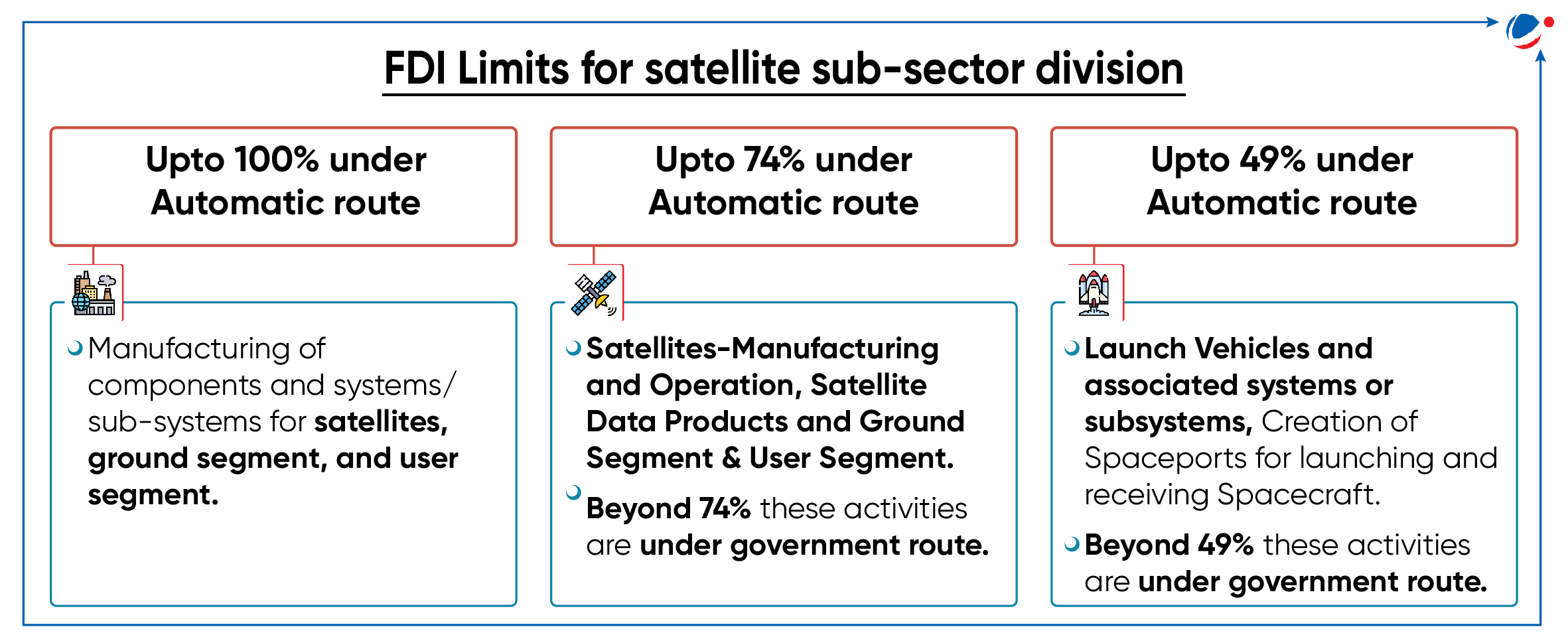Why in the news?
Government recently relaxed rules to allow 100% foreign direct investment (FDI) in space sector.
More about News
- Existing FDI policy in Space sector: Earlier, FDI was permitted in the establishment and operation of Satellites through the Government approval route only.
- Amended FDI policy:
- 100% FDI is allowed in space sector in line with the vision and strategy under the Indian Space Policy 2023.
- The liberalized entry routes are aimed to attract potential investors to invest in Indian companies in space.
- 100% FDI is allowed in space sector in line with the vision and strategy under the Indian Space Policy 2023.

Significance of the amended policy
- Integration withglobal value chains: The FDI policy reform is expected to integrate Indian companies into global value chains.
- Indigenisation: Enabling modern technology absorption, and making the sector self-reliant, encouraging Make in India and Atmanirbhar Bharat initiatives of the Government.
- Focus on R&D: Reforms allow ISRO to concentrate on cutting-edge research and development, exploration missions and human spaceflight programme.
- Enhance Ease of Doing Business: Set to lower entry barriers for foreign players, fostering a more inclusive environment for international investments, technology transfers, and collaborative research in space technology.
- Greater FDI inflows: It will contribute to growth of investment, income and employment.
- In 2021-22, ₹ 175 Crore was generated towards export of launch services, data sales and in-orbit support services and post-launch operations.
- Enhance share in global space economy: With increased investment, India would be able to achieve sophistication of products, global scale of operations and enhanced share of global space economy.
- Currently, India accounts for only around 2-3 % of the global space economy ($8.4 billion), much behind the major players such as the US and China.
Steps taken by India to support private sector in space
- Indian Space Association (ISpA): Launched in 2021, it is the apex, non-profit industry body exclusively working towards successful exploration, collaboration, and development of private and public Space Industry in India.
- Antrix Corporation Limited: Incorporated as a marketing arm of ISRO. It handles ISRO’s commercial deals for satellites and launch vehicles with foreign customers.
- The Indian National Space Promotion and Authorization Centre (IN-SPACe): An autonomous nodal agency to facilitate private sector engagement in space activities.
- To encourage private investment, the government has also exempted private launch service companies from paying GST when they launch satellites.
- India space policy 2023 suggests that the private sector is a critical stakeholder in the entire value chain of the space economy.
Way forward to sustain the growth of space sector
- Regulation: To compete globally, India requires the Space Activity Bill to be passed, fostering a thriving space industry and advancing participation in the global space economy.
- Technological Advancement: Collaborate with the IT sector to leverage India's expertise in information technology for space applications.
- Technology Transfer: Facilitate technology transfer from ISRO to the private sector, particularly for initiatives like the Small Satellite Launch Vehicle (SSLV).
- Focus on Affordability and Accessibility: Develop business models that make space solutions affordable and accessible to millions, addressing ground infrastructure and connectivity needs.
- International Collaboration: Foster partnerships with global space agencies (E.g.: India joined Artemis Accords in 2023) and industry players to leverage expertise and resources.



